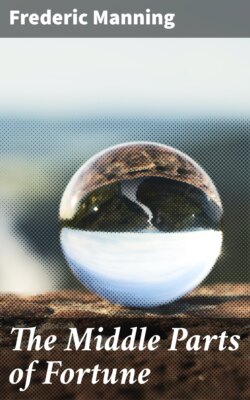The Middle Parts of Fortune

Реклама. ООО «ЛитРес», ИНН: 7719571260.
Оглавление
Frederic Manning. The Middle Parts of Fortune
The Middle Parts of Fortune
Table of Contents
VOLUME I
Chapter I
Chapter II
Chapter III
Chapter IV
Chapter V
Chapter VI
Chapter VII
Chapter VIII
Chapter IX
Chapter X
VOLUME II
Chapter XI
Chapter XII
Chapter XIII
Chapter XIV
Chapter XV
Chapter XVI
Chapter XVII
Chapter XVIII
THE END
Отрывок из книги
Frederic Manning
Published by Good Press, 2021
.....
It was his expression, his manner, something in the way he moved and spoke, which made one feel that only an enormous effort enabled him to bridle the insubordinate and destructive energy within him. Perhaps in battle it broke loose and gratified its indomitable appetites. This is not to say that he was fearless: no man is fearless, fear is one of the necessary springs of human action; but he took pleasure in daring, and the pleasures of men are probably incomplete, unless some poignancy accompanies them. Just before the attack was launched, he had climbed out of the trench and walked along the parapet, less as though he were encouraging the men, than as though he were taunting them; and after they were back in their original position that night, he had found that he had forgotten his ash-stick, and had returned to the captured trenches to get it. There was nothing deliberate in either of these actions, they were purely spontaneous. He would not have gone into an attack with a hunting-horn, or dribbled a football across no-man's-land: probably he would have thought anything of the kind a piece of sentimental levity. All that he did was improvised, and perhaps he had more than his fair share of luck.
Evidently he was very much troubled about Mr Halliday; and whenever he was troubled, he became impatient and angry, not with any particular individual, but with the nature of things, and the order of the universe. Mr Watkins had been killed outright, and there was no more to be said on that point, except that he was one of many good fellows. There was nothing perfunctory in that summary regret; it was keen and deep, but one could not pause on it. The case of Mr Halliday was different. Bourne had seen him first with a slight wound in the arm, and had then seen him wounded again in the knee. Probably the bone was broken. That was in the German outpost line, and he had been left there in comparative shelter with other wounded who were helping each other. After that moment, nothing further was known of him, as they had no information of him having passed through any dressing-station. Moreover, the medical officer, after working all day, had taken the first opportunity to explore a great part of the ground, and to make sure, as far as that were possible, that no wounded had been left uncollected. Of course night and the shellholes may not have yielded up all their secrets. The problem of Mr Halliday's fate seemed insoluble. At last Captain Malet ceased to probe the mystery. He dropped it abruptly, and asked Bourne about himself, with a half humorous kindliness; then, the men having been dismissed, he walked off towards the orderly-room looking preoccupied and tired.
.....